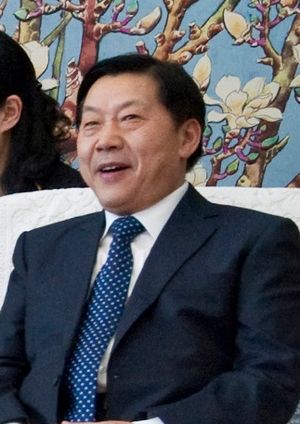Lu Wei (politician) facts for kids
Quick facts for kids
Lu Wei
|
|
|---|---|
|
鲁炜
|
|

Lu Wei
|
|
| Director of the Cyberspace Administration of China | |
| In office August 2013 – June 2016 |
|
| General secretary | Xi Jinping |
| Preceded by | Wang Chen |
| Succeeded by | Xu Lin |
| Vice-Mayor of Beijing | |
| In office March 2011 – April 2013 |
|
| Leader | Guo Jinlong → Wang Anshun (mayor) |
| Personal details | |
| Born | January 1960 (age 66) Chaohu, Anhui, China |
| Political party | Chinese Communist Party (expelled) |
| Alma mater | Guangxi University of Radio and Television Renmin University of China |
Lu Wei (simplified Chinese: 鲁炜; traditional Chinese: 魯煒; pinyin: Lǔ Wěi; born January 1960) is a former Chinese government official. He held important roles in China's internet and media sectors. From 2013 to 2016, he led the Cyberspace Administration of China (CAC). This agency manages internet policies in China.
Before that, Lu Wei was a Vice-Mayor of Beijing. He also led the propaganda department for the Beijing Party organization. In 2015, Time magazine recognized him as one of the world's 100 most influential people. Later, he faced serious issues regarding his conduct. He was removed from his positions and faced consequences for his actions.
Contents
Lu Wei's Early Life and Career
Lu Wei was born in January 1960 in Chaohu, a city in Anhui province, China. He was known for being direct and lively in his work.
Starting in News Media
In 1991, Lu Wei began working at the Xinhua News Agency in Guangxi province. He started as a deputy director. By 1997, he was promoted to become the director there.
From 2001 to 2004, he continued to advance within the Xinhua News Agency. He became a deputy director for the entire agency.
Moving to Beijing Government
In March 2011, Lu Wei took on new responsibilities in Beijing. He was appointed as a Vice-Mayor of Beijing. He also became the head of Beijing's Propaganda Department. He was a member of the Beijing Municipal Party Committee.
He held these important roles until April 2013.
Leading China's Internet Policy
In April 2013, Lu Wei was appointed as the Chairman of the State Internet Information Office. He also became the vice-chairman of the State Council Information Office. Later that year, he became the head of the Cyberspace Administration of China (CAC). This agency is very important for managing the internet in China.
Promoting the Chinese Dream
On October 30, 2013, Lu Wei gave a speech at the 13th China Internet Media Forum. He talked about the "Chinese Dream." This idea was made popular by Chinese Communist Party general secretary Xi Jinping.
In May 2014, Lu Wei was promoted again. He became a deputy minister of the Publicity Department.
Visiting the United States
In December 2014, Lu Wei visited the United States. In Washington, D.C., he met with senior officials. They discussed topics like internet security.
He also visited Silicon Valley. There, he met with leaders from major technology companies. These included Apple, Facebook, and eBay.
Changes in Lu Wei's Career
In June 2016, Lu Wei suddenly stepped down from his role at the Cyberspace Administration of China. The reasons for this were not made public. He remained a deputy head of the propaganda department for a while. However, he gave up his other important titles.
In November 2017, Lu Wei was placed under investigation. This was part of a larger effort to ensure officials followed rules. He was the first high-ranking official to be investigated after the 19th Party Congress.
In February 2018, he was removed from the Communist Party. Officials stated that he had acted improperly and used his power incorrectly. They said he did not follow rules and tried to gain personal fame.
On October 19, 2018, a court in Ningbo heard his case. He was accused of using his position to help others unfairly and accepting large sums of money. Lu Wei admitted to the accusations in October. On March 26, 2019, he was removed from his positions and faced consequences for his actions.
 | Sharif Bey |
 | Hale Woodruff |
 | Richmond Barthé |
 | Purvis Young |

